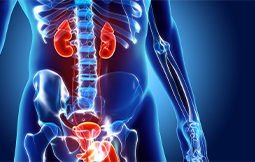
Urology is a part of health care that deals with the diseases of the male and female urinary tract (kidneys, ureters, bladder, and urethra). It also deals with some parts of the male genitals that are able to make babies.
Urology is a part of health care that deals with the diseases of the male and female urinary tract (kidneys, ureters, bladder, and urethra). It also deals with some part of the male genitals that are able to make babies. Since the health problems in these body parts can happen to everyone, urologic health is very important. Urology is also known as a surgical specialty. Besides surgery, a urologist is a doctor with knowledge of internal medicine, pediatrics, gynecology, and other parts. This is because a urologist deals with a wide range of clinical problems.
Symptoms of urology problems include:
Be sure to tell your doctor if you are taking any kind of anticoagulation or blood-thinning medication, such as aspirin, Warfarin, Heparin or Coumadin. These medications are always discontinued 10 days before the surgery. However, it is very important that you always check with your surgeon as well as the doctor who prescribed your anticoagulation or blood-thinning medications before discontinuing them. You will need a clearance report from your primary care physician. He or she needs to perform a few physical examinations within two weeks of your surgery. You will need to have blood and urine tests also within two weeks of the surgery. You may also need a chest X-ray and/or an EKG and other tests, as indicated by your medical condition.
Most Common Urologic Surgical Procedures are:
Inpatient –
Outpatient procedures –
During the surgery you are given anesthesia and the pain medications that are used during and/or after the surgery, your normal bowel function is depressed. It takes several hours for anesthesia to wear off, and some people may notice nausea and/or dry mouth. If you have nausea then you should tell your doctor about this so that the medication can be given to help you with this. At first you should just take small sips of water. This will help to hydrate you and usually will not cause nausea. Your medical team can also ask you if you are passing gas, and will listen to your abdomen. This helps them to determine if your lower intestines are “waking up”. After the surgery you may have a urinary catheter inside you. It will be removed and the doctors will make sure you can urinate on your own without any problems before your discharge from the hospital. After many urinary systems or kidney surgeries, it is not uncommon to have some blood in your urine for a couple of days. This should clear up if you drink plenty of fluids and as you heal.
Risk factors of Urology are:-
Copyright © 2025 IMA | All Rights Reserved.